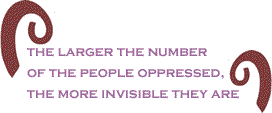
|
|||||||||||||||||||||||

|
|

Custom Search
|
|
 |
|
Barack Obama
feels able to counsel others - most recently Armenians and Turks
- to work through their pasts “in a way that is honest, open and
constructive.” Otherwise, he cautions, unresolved history “can be
a heavy weight.” This is a big step back from
engagement with the international community, which the Obama administration
had seemed to be promoting quite vigorously. And the All peoples of all colors have practiced slavery, race, oppression, and/or discrimination with varying ferocity. These are uncomfortable subjects at the best of times, but that’s no reason not to talk about them. Otherwise, they are indeed a heavy weight. Besides, by boycotting the conference,
the Even though the Why does racism still lurk within so many of them? Or, rather, within so many of us - few members of the human race are immune. And what actions can people take when governments don’t act? A first step in dealing with the racist within is to become more conscious of the use of language. Among Arab Americans, for example, it is common to hear the expression “She’s pretty, even though she’s dark.” Or “Whiten our face,” meaning, “Do us proud.” When the implications are pointed out to them, some resist the accusation; others do change their speech and behavior. At the same time, Black Americans
account for the largest ethnic group among Muslims in
The truth is, even as people struggle valiantly against slavery, racism, and colonialism, the features of the oppressor can insidiously come to be seen as superior. Conscious effort is needed not just to promote emancipation and end Jim Crow laws but also to change social mores. For many peoples, the struggle
against colonialism has created a strong sense of solidarity. In
a recent example, powerful for its symbolism, South African dockworkers
in Many Black Americans have also supported the Palestinian struggle, some putting their careers at risk to do so. Although Arab American organizations reach out to Black, Latino and other communities, the Arab American community itself does not yet express sufficient understanding of and support for Black, Latino or other minority causes. Prison would be a good place
to start working on shared solidarity. The Palestinians could certainly
resonate to these data. Some 11,000 Palestinian prisoners are in
Israeli jails. It is said that nearly a quarter of the population
has been jailed by As both communities know to
their cost, the larger the number of the people oppressed, the more
invisible they are. Many people know the name of And people find it far easier to blame the victim than the perpetrators or the conditions that create victim hood. Racist explanations abound as to why so many Black Americans are in jail. Discussions of race and oppression
are often divisive and disruptive, but the road to freedom and real
equality begins there. The Obama administration, which speaks so
often of seeking justice at home and abroad, has set us all back
with the roadblock it erected on the road to the Durban review conference.
The real heroes of BlackCommentator.com
Guest Commentator. Nadia Hijab, is a Senior Fellow at the Institute
for |
|
Any BlackCommentator.com article may be re-printed so long as it is re-printed in its entirety and full credit given to the author and www.BlackCommentator.com. If the re-print is on the Internet we additionally request a link back to the original piece on our Website. Your comments are always welcome. eMail re-print notice
If you send us an eMail message we may publish all or part of it, unless you tell us it is not for publication. You may also request that we withhold your name. Thank you very much for your readership. |
|
| |
|
| July
2, 2009 Issue 331 |
|
| Executive Editor: Bill Fletcher, Jr. |
| Managing Editor: Nancy Littlefield |
| Publisher: Peter Gamble |
| Est. April 5, 2002 |
Printer Friendly Version
in resizeable plain
text format or pdf
format. |
| Frequently Asked Questions |
 |

|
 |
 |
 |
| |
| |






























 Among
Black Americans, a shared experience of oppression does not necessarily
translate into race-free relations. There are tensions between diverse
ethnicities; different values are attached to skin shades and hair
types. As her husband’s race for the presidency grew more serious,
Michelle Obama’s hair grew straighter, part of a makeover grounded
in a belief that Americans still ascribe a lower value to “kinky”
hair.
Among
Black Americans, a shared experience of oppression does not necessarily
translate into race-free relations. There are tensions between diverse
ethnicities; different values are attached to skin shades and hair
types. As her husband’s race for the presidency grew more serious,
Michelle Obama’s hair grew straighter, part of a makeover grounded
in a belief that Americans still ascribe a lower value to “kinky”
hair.






